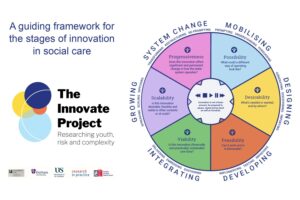Introducing new practices to children’s social care can be hugely challenging. Innovation is demanding of time, energy and finance, and system change can be disruptive. There is a risk that new initiatives will fail, and that attention and resources are unhelpfully diverted away from vulnerable children and families.
Funded by the Economic and Social Research Council, the Innovate Project explored how innovation could be fostered and implemented more safely in children’s social care. It also examined how innovative new child protection approaches could be successfully introduced.
The four-year project has benefitted service providers and safeguarding organisations within social care. Those leading practice and system change are better able to plan and implement innovations. Staff working with vulnerable young people and their families report feeling more confident and skilled in their work as a result.
In one local authority, this has improved young people’s experiences of the social care system and helped increase their safety.
About the project

‘Safeguarding Young People Beyond The Family Home: Responding to Extra-Familial Risks and Harms’. Credit: Firmin, C; Lefevre, M; Huegler, N; and Peace, D (2022). Bristol: Policy Press
The complex and interconnected nature of harms faced by young people outside the home poses particular challenges for social care. Issues such as child sexual exploitation, ‘county lines’ criminal exploitation, peer-on-peer abuse and weapon-enabled violence require fresh approaches to the ways that services are structured and delivered.
Led by Professor Michelle Lefevre, University of Sussex, in collaboration with Durham University, Research in Practice and Innovation Unit, the Innovate Project focused on new approaches to addressing these safeguarding risks.
The team worked with local authorities and charities across the UK. They worked to explore the effectiveness of different innovations in social care settings and produce a series of frameworks and toolkits to help develop and implement new approaches.
Understanding innovation in social care

‘Innovation in Social Care: New Approaches for Young People affected by Extra-Familial Risks and Harms’. Credit: Lefevre, M; Huegler, N; Lloyd, J; Owens, R; Damman, J; Ruch, G; and Firmin, C (2024). Bristol: Policy Press.
The unique context of social care settings meant the processes of innovation required studying in context, says Professor Lefevre:
You can’t fundamentally understand innovation in social care unless you’re looking at it as it happens.
So, while we used surveys and examined literature and policy to map the field and learn about current approaches and models, importantly, we also worked closely with social care organisations to gain an ‘on-the-ground’ perspective.
This gave us valuable insights into what stimulates innovation and how a new response unfolds in practice.
Three new approaches
Working with six local authorities, charities and interagency safeguarding networks around the country, the team scrutinised how they interpreted and adopted one of three promising new approaches to supporting young people and their families. The three new approaches are:
- trauma-informed practice, where practitioners work collaboratively to build trust and avoid re-traumatising young people
- contextual safeguarding, which seeks to intervene directly with groups of young people, and in community spaces where risks have been identified
- transitional safeguarding, which develops multi-agency responses that avoid the systems ‘gap’ that occurs when children move from child to adult services at 18
Frameworks and toolkits
Building on learnings from mapping the field, the team developed a series of frameworks and toolkits in partnership with the social care practitioners, including guidance on:
- developing more trustworthy innovation
- what to expect on the innovation journey
- creating systems conducive for innovation
- ensuring young people’s voices are included in decision-making
Professor Lefevre says:
Reflective learning weaved its way throughout the project. Our frameworks were informed by sector leaders and practitioners. Then, through access to case files, observing professional meetings, and hearing from young people and parents, we were able to see how these new approaches developed.
It enabled us to liaise and feed in positive changes, as well as refine the frameworks. We then shared and discussed all these findings through regular webinars with policymakers, practitioners and leaders from across the social care sector.
Impact of the project
Through its publications, infographics and tools, webinars and conferences, the project has been able to engage with the wider social care sector and influence innovation practice in ways that benefit vulnerable young people.
Influencing innovation practice by service providers
Leaders and managers in social care agencies reported that they are drawing on the project’s findings to review and shape the planning and implementation of new approaches, as well as critically examine current approaches.
One webinar participant said the findings had helped them to “think about structural changes that are needed to support change and identify what strengths we have”.
Innovation Wheel
Insights from the project revealed that staff need to be supported through innovation. Professor Lefevre says:
Our research also demonstrated that implementing these approaches requires organisational change that takes into account how staff may need extra time or support. Our infographic of the ‘Innovation Wheel’ helped services to plan and review their progress on the different stages of the innovation journey, including understanding common barriers a team may face.
The ‘wheel’ helped Wiltshire Council’s Families and Children’s Transformation Programme to explain to their interagency and adult social care partners that the challenges they were experiencing in developing a transitional safeguarding approach were to be expected.

The Innovation Wheel. Credit: the Innovate Project
Building energy and momentum
By demonstrating the importance of “pausing, assessing, and refreshing” their approach, their programme was able to further build energy and momentum in their partnership towards the innovation goals.
Devon Children’s Services used the project’s findings and system review tools to better understand its strengths and areas for development, and to plan priority areas of action. Professor Lefevre witnessed the “shared perspective and sense of purpose” that built.
As a result, Devon Children’s Services has been able to rethink some key aspects of its adolescent safeguarding approach and gain strategic level permission for further developments, such as preventative work with young people in the community.
Benefitting vulnerable young people
By improving the ways that organisations work, young people and their families have had better service experiences, and some young people have become safer as a consequence. Through its involvement with the Innovate Project, North Lanarkshire Children and Families team were able to successfully introduce trauma-informed practice across its services.
The benefits of this were recognised in a regulatory inspection in 2023 by the Care Inspectorate, which praised the team for its “overarching cultural change in how children’s rights were promoted, trauma was understood, and how relationships were approached” and the “positive impact” it was having on how children and young people experienced services.
Professor Lefevre adds:
The inspection report shows that staff have now developed more positive and trusting relationships with children and young people. As children and young people have become more meaningfully and involved in decisions about their lives in North Lanarkshire, they have also become safer because risks have been identified early and responded to effectively.

